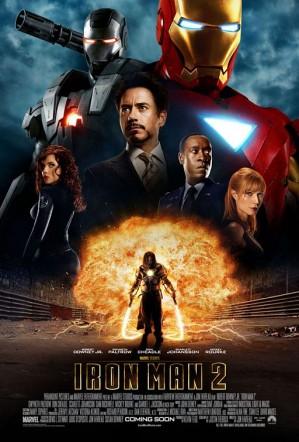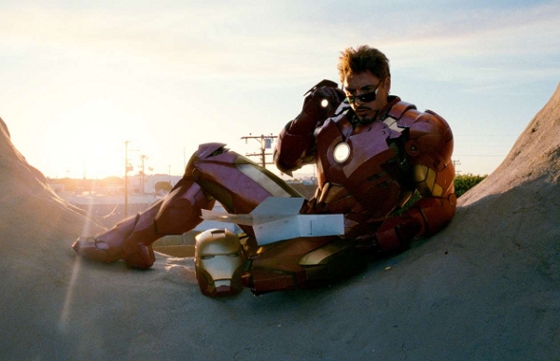The sequel to Iron Man is a sporadically entertaining follow up to the 2008 original but suffers by introducing a raft of new characters from the wider Marvel universe.
When the first film was about to be released, it was something of an unknown quantity: the Iron Man character was not as famous as Batman, Spider-Man or Superman; it was self-financed by Marvel; lead actor Robert Downey Jnr had been through some well documented troubles; and Jon Favreau was new to directing a tent-pole release like this.
Despite those question marks, it was a genuine mainstream success that proved a major hit at the global box office and was warmly received by the critics, to the point where this sequel is one of the most hotly anticipated blockbusters of the summer.
The basic story of this franchise concerns a billionaire inventor named Tony Stark (Robert Downey Jnr) who, after being captured by terrorists, invents a robotic suit that allows him to atone for his past as an arms dealer.
 This one starts with him reaping the acclaim as an all-American hero who has “successfully privatised world peace”.
This one starts with him reaping the acclaim as an all-American hero who has “successfully privatised world peace”.
However, various problems emerge: the US military and a rival defence contractor (Sam Rockwell) want access to his technology; a mysterious Russian inventor (Mickey Rourke) is hell bent on revenge; and Stark faces a major health from wearing the Iron Man suit.
Like the first film, this has solid foundations: the lead characters are engaging and funny (especially Downey Jnr, who was perfectly cast in the lead role), the blend of banter and action is good and there are some terrific visual effects from ILM, especially the blending of the mechanical suit with the CGI one that flies around.
The problems emerge when characters from S.H.I.E.L.D. start to turn up, principally Nick Fury (Samuel L. Jackson) and Black Widow (Scarlett Johansson).
If you stuck around until the end of the credits sequence for the first film, you would have seen a cameo from Nick Fury and later that summer in The Incredible Hulk (another Marvel character) Tony Stark his own post-credits cameo.
What does this all mean?
Well, Marvel are preparing for an Avengers film (and I’m not talking about the one with Sean Connery dressed as a teddy bear) which is reportedly going to combine various characters including Iron Man, Captain America and the S.H.I.E.L.D. gang.
But this to me hints at a wider malaise amongst Hollywood studios, who now pander too much to the geek community.
It is a trend that has gathered pace since the enormous success of the X-Men and Spider-Man films over the last decade.
With the rise of events like Comic-Con, it seems like studios have become addicted to chasing this market, to the point where there are detailed panels and press conferences about films months before they are actually released.
In the case of Iron Man 2, it seems like a lot of compelling elements have been drowned out by trying to cram in all of this other stuff designed to make comic book fans gasp ‘awesome!’ when they read about it on sites like Ain’t It Cool.
This extended fanboy hype and pre-judgement is already a major problem, but in the case of this film the more compelling elements, such as Stark’s relationship with his assistant Pepper Potts (Gwyneth Paltrow) and his conflict with the military, get crowded out by other stuff.
There was one stretch where Mickey Rourke’s character (who is pivotal) seems to be off screen for such a long time that when he returns, it seems like he’s been on holiday.
When the big climax arrives, it doesn’t have the necessary impact because so many threads have been weaved in order to get there.
This is a shame because much of what is in the film is pretty good: Downey Jnr still makes an arrogant billionaire genius to be likeable; Paltrow suits her role nicely; and in key supporting roles Rourke and Rockwell are good value.
Plus, some elements seem to have been literally cut out: one notable moment from the trailer is absent from the film, although why this is the case when it lasts about 20 seconds is hard to fathom.
For the next film, I hope that the film-makers strip away the S.H.I.E.L.D. elements and focus on the basic stuff that works.
It is worth remembering that there is value in not pandering to the masses. Did Orson Welles obsess over what audiences wanted when he made Citizen Kane? Did Francis Ford Coppola unveil work-in-progress footage to screaming geeks when he made The Godfather?
In the case of a huge franchise like Star Wars, it was depressing to note the drop in quality when George Lucas started pandering to what he though fans wanted in the prequels. Instead of Han Solo we got Jar-Jar Binks.
Henry Ford once said:
“If I’d asked my customers what they wanted, they’d have said a faster horse.”
In the case of blockbusters I’d humbly suggest studios and directors trust their own vision rather than trying to cram in elements that play well at comic book conventions.
This is still going to be a massive film at the box office but if it focused on its core elements, it could have been a better one.
> Official site
> Iron Man 2 at the IMDb
> Find out more about the character at Wikipedia
